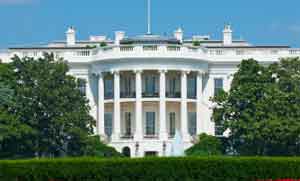We have a new president, same as a previous president.
What a country.
Most presidential election years, I take to these columns following the outcome to offer my apolitical perspective on what the results mean for the supply chain.
Gilmore Says.... |
 |
In the short term, expect a surge in imports and freight volumes as companies attempt to bring goods into the US to beat the tariffs. But after that, import freight volumes should decline precipitously.
|
 |
What do you say? |
|
| Click here to send us your comments |
| |
|
|
|
With the Trump victory, that exercise is both easier and harder than a normal post-vote perspective. Easier because we’ve obviously been down this path before for four years, and Trump has been quite specific in some cases on what he intends to do in term 2.
More difficult because Trump is unpredictable to put it mildly. His rhetoric in some cases can be far away from the reality,
But I call them as I see them, and here is my take.
Let’s start with tariffs. In 2018, Trump imposed two rounds of tariffs, primarily on Chinese imports. Upon taking office from Trump after the 2020 election, President Biden decided to quietly maintain those tariffs in his administration.
As a note, the tariffs seem to have reduced imports from China very modestly, but mostly to the benefit of other low cost Asian countries and Mexico.
But Trump says he wants to take tariffs to whole new levels, really to uncharted waters. He has vowed to assess across-the-board tariffs of 10% to 20% on all imports arriving into the United States and a 60%-100% tariff on Chinese imports. He has also stated he wants to enact the tariffs quickly upon taking office.
What this would mean is impossible to know. A global trade war? A resurgence in US manufacturing (doubtful)? Geopolitical chaos? Rising inflation?
One thing that you can take to the bank: There would be many unintended consequences. Trump hopefully will educate himself on these.
In the short term, expect a surge in imports and freight volumes as companies attempt to bring goods into the US to beat the tariffs. But after that, import freight volumes should decline precipitously.
Switching topics, let’s ponder the impact of the election on oil and energy.
It’s going to be “drill baby drill,” with barriers of all types to US energy production being removed.
US oil production should further jump from already high levels, with some experts calling for the price per barrel to fall to $50 or even $40, sending gas and diesel prices tumbling – and acting like a tax cut to consumers and many businesses.
It could even send general prices down, leading the Fed to reduce interest rates faster as this plays out.
As a note, such a significant drop in diesel prices will also make it harder to justify a move to electric trucks.
So let’s move to the topic of EVs – both cars and freight trucks.
 I believe the pressure from Washington to move to electric vehicles will slow dramatically if not end completely. The transition will be market/demand-driven, not regulatory, at least at the Federal levels. I believe the pressure from Washington to move to electric vehicles will slow dramatically if not end completely. The transition will be market/demand-driven, not regulatory, at least at the Federal levels.
How that will play out with state actions in California and perhaps elsewhere will be interesting to see. But it seems clear the EV movement will be on a significantly different trajectory, making auto workers in Michigan happy.
Based on statements made before the election, it appears likely the US will pull out of the UN Climate Accords, as Trump did the first time around. It is not clear what the fall out from such a movement will be.
Control of the National Labor Relations Board (NLRB) will fall to the Republicans. Despite the party’s support from blue collar workers, I believe the Federal effort to classify contract workers as employees will halt.
So that’s my perspective. How do you see this playing out?
It is likely to be a wild ride.
Any reaction to this column on Trump and the supply chain from Gilmore? Let us know your thoughts at the Feedback button (email) or section below.
Your Comments/Feedback.
|